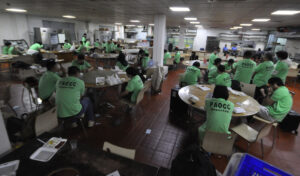
Local government units told to follow suit after Bulacan prohibits POGOs
By John Victor D. Ordoñez, Reporter and Chloe Mari A. Hufana
A PHILIPPINE senator on Sunday urged local government units (LGUs) to ban offshore gaming operations after Bulacan did so last week given their alleged links to crimes.
“LGUs should emulate the decisive action taken by the Bulacan provincial government and several other city governments to outlaw Philippine Offshore Gaming Operations (POGOs) in our communities,” Senator Sherwin T. Gatchalian said in a statement.
“Given the various criminal activities associated with POGO operations, our communities stand a better chance of achieving inclusive economic growth without POGOs,” he added.
The senator said the ban would ensure peace and order in local communities.
The Senate ways and means and dangerous drugs committees are set to tackle a bill that seeks to outlaw all forms of online gambling.
Under Senate Bill No. 1281, people who gamble on the internet face six months of jail time and a fine of as much as P500,000. The measure seeks to repeal all laws, executive orders and other rules that allow online gambling.
Bulacan Governor Daniel R. Fernando last week issued an order banning offshore gaming operations in the province.
The provincial board had also passed an ordinance banning POGOs and other similar activities within the territorial jurisdiction” of Bulacan.
“There are social issues, human trafficking, torture, money laundering, kidnapping, prostitution, different crimes in POGOs,” Bulacan Vice Governor Aexis C. Castro told reporters last week after the board approved the ordinance. “We would not let these things happen in Bulacan as these are all crimes brought by POGOs.”
The Senate is in the middle of its probe looking into crimes linked to POGOs, which are mostly Chinese gambling firms that operate online casinos from the Philippines.
Philippine Amusement and Gaming Corp. (Pagcor) Chairman and Chief Executive Officer Alejandro H. Tengco told a Senate hearing last week that his agency has banned POGO hubs and was working on guidelines on these gambling operations.
Pagcor earlier said the government could lose P20 billion in yearly revenues if POGOs are banned.
Congress under former President Rodrigo R. Duterte passed a law taxing POGOs to legalize them, despite concerns about their social costs. Chinese President Xi Jinping had asked him to ban their operations.
The benefits of a total POGO ban outweigh the risks of their continued operations, Calixto V. Chikiamco, Foundation for Economic Freedom president, told BusinessWorld in a Viber message.
“Economic managers are united in saying that the social and economic costs of hosting POGOs exceed the diminishing revenue we generate from them,” he said.
“Hosting POGOs represent a reputational risk for the Philippines and aggravates our relationship with China, which also doesn’t want these POGOs operating here and targeting customers in China,” he added.
EMPLOYMENT COSTS
Edwin S. Estrada, a faculty of the School of Diplomacy and Governance of De La Salle-College of Saint Benilde, said crimes threaten national security.
“Crime always affects national security and peace and order whether coming from locals or foreigners,” he said in a Viber message. “China doesn’t want us to accommodate POGOs precisely because of the illicit activities connected to them.”
Finance Secretary Ralph G. Recto earlier said a letter recommending a total POGO ban had been sent to Mr. Marcos.
National Economic and Development Authority (NEDA) Secretary Arsenio M. Balisacan said the Cabinet had yet to discuss the ban.
Michael L. Ricafort, chief economist at Rizal Commercial Banking Corp., told BusinessWorld in a Viber message that POGO operations in the country had diminished over the years.
Still, he said a total ban could affect local employment and demand for real estate.
“[The ban] may have adverse impacts in terms of reduced employment for locals in POGO operations, reduced demand for real estate rentals for residential, office and commercial properties and even purchases of residential condominiums,” he said.
Retailers and other commercial establishments could also face reduced demand.
“Supplies or any other businesses or industries in the supply chain of POGOs could be adversely affected such as rental/lease income, employment agencies and other related and allied products and services needed by POGOs from locals,” Mr. Ricafort said.
Transport and logistics serving POGOs could also lose their business, he added.
Pagcor, which regulates these gambling firms, said tighter regulation would be better.
“We prefer to simply tighten regulations and enhance law enforcement against illegal operators to protect legitimate operators and foreign investors in the sector which now include many nationalities aside from the Chinese,” Pagcor Assistant Vice-President for Corporate Communications Catalino B. Alano, Jr. said in a Viber message.
He said Chinese investors account for only 50% of licensed operators.
“We have no guarantee that once we ban the legitimate operators, they will simply close shop and return to their countries of origin where they are likely to face prosecution and jail, or worse,” Mr. Tengco said in a statement on July 11.
He said operators might go underground once they are banned. He added that the real problems are the criminal syndicates masquerading as POGOs.
The Presidential Anti-Organized Crime Commission has raided POGO hubs believed to be linked to human trafficking and other crimes.
The Senate over the weekend issued an arrest warrant against the mayor after citing her in contempt for skipping Senate hearings.



